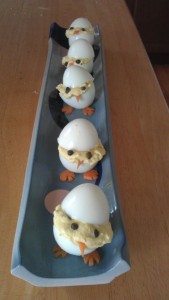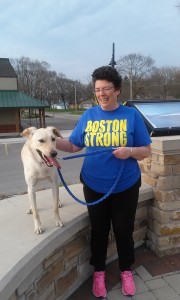What was he thinking? This is the question that I have been asked over and over again this week, starting with Mark Seigle on Sunday when it was breaking news and continuing at the Lions Club where I spoke Thursday night and at Weight Watchers. What was Sterling thinking? And in truth, I think he wasn’t. I am not going to try to explain it or excuse it. It was wrong. Period. There is no place in Judaism for racism. It is sad to have to call him Jewish, but we do. At least as someone who self-identifies as a Jew but who changed his name to sound less Jewish.
On the other hand, Adam Silver, the NBA commissioner, made me proud this week. Happy to call him a Jew.
Members of the congregation actually wondered why we were exploring this. “A waste of time” said one, as he rolled his eyes. “Oh, no,” said another.
So what is going on here? Why do people ask the question, “Is it bad for the Jews or good for the Jews?” What does it mean that this is a shonda, a shame?
The discussion centered on some expected answers. There are good apples and bad apples in every bunch. You can’t hold all Jews to a higher standard. What he did was wrong but he didn’t do it acting as a Jew so why should we care. We don’t need to claim another bad guy (which I didn’t hear correctly and it sounded like black guy and that just sounded wrong. So glad I made that person repeat!)
Why this is important comes from this week’s Torah portion. We tend to gloss over it. It says that “you must treat them as holy,” referring to the priests. Now, I remember a very funny scene at a ritual committee meeting, where one member when we were talking about traditional duchening, the giving of the priestly benediction, thought that I meant a Catholic priest was coming to bless the congregation. Truth be told, we don’t have many functions for cohainim any more. They may duchen, have the first aliyah and officiate in a pidyon haben, the redemption of the first born. There are those who would argue that we should do away with all of that because no one can trace their lineage well enough to be called a cohain, and in this day and age we are not so big on hierarchies. That is a discussion for another day.
So since the destruction of the Temple in Jerusalem, a mere 2000 years ago, much of this portion, since the priests don’t offer bread to G-d, is irrelevant. And yet, and yet…
We are told that we are to be a light to the nations, a kingdom of priests and a holy nation. That’s all of us. A kingdom of priests and a holy nation. We are told that “Synagogues, study houses, and even homes are called mikdash me’at, a small temple. According to the Talmud (Megilah 29a), God will dwell in the holy spaces we create, for those small spaces are the Temple in miniature.
So our small spaces are to be holy. We are commanded to make the home a safe place (Deut 22:8) Not only physically safe, but emotionally safe. Our homes and our synagogues should be filled with Shalom Beit, peace in the home. Like Abraham and Sarah’s tent, open to all four sides to welcome guests, they are places of hospitality. We mark our homes and our synagogues as holy, set apart by putting a mezuzah on the door to remind us of the commandments and of G-d’s oneness. Our homes are a place where G-d dwells within, just like the Holy Temple.
For us, in this building, this mikdash me’at, it means we need to refrain from being judgmental of others. It means we need to refrain from gossip, of speaking badly of others. We are all in this game together. We are all volunteers striving to create a Jewish community dedicated to being a sacred community, a holy community, a diverse community of life long learners and meaningful observance. At its center is community, Kneseth Israel, an assembly of Israel.
I say all, including me, because I am not a priest. I am a rabbi. And while the portion says that you must treat priests as holy, “Rabbis and cantors are no different from other Jews. They have no special powers, no obligations devolve on them that do not apply to all Jews. “Ten shoemakers can make a minyan but nine rabbis can’t.” Nonetheless, they are considered klei kodesh, instruments of holiness because, through their knowledge and teaching, life character, and commitments they show the way to a life of holiness.” (Eitz Chayyim, page 718)
So I must strive to lead my life by example. I must be klei kodesh. But unlike the rest of the portion which specifies that a priest must be without blemish, I don’t have to be perfect. I am no different than any of you. Together we are all a kingdom of priests and a holy nation.
The problem with Sterling was his house was not a mikdash me’at, it was a not a holy place. And his speech was not lashon hakodesh, holy speech but lashon ha’ra, evil speech.
Coming out of this week’s portion we learn from the Mishneh Torah, “we are obligated to act in a way that reflects well on G-d, the Jewish people and our tradition (Kiddush hashem sanctification of the name) and to refrain from acting in a way that would bring dishonor to God, our people and its traditions Chilul Hashem (MT 5:1)”
Our tradition is very clear. We read it last week. We are to be holy because the Lord our God is holy. We are to welcome the widow, the orphan, the stranger, the most marginalized among us precisely because we were strangers, slaves in Egypt. We are not to put a stumbling block before the blind or curse the deaf. We are not to stand by while our neighbor bleeds. We are to have just weights and measures. We are not to withhold the wages of a laborer overnight. We are not to show deference to the rich or favor the poor in judgment.
Sterling thought because of his wealth he was above the law. He was arrogant. Silver did exactly what he did according to Jewish law—he did not favor the rich. Megal in his article on Sports on Earth, summed it up this way: Silver is Gold.
“There have always been hateful, immoral people like Donald Sterling within every ethnic group. But to see him out front, the most famous man in the news right now, and that he can be called Jewish, with particular glee from those with hateful attitudes toward Jews, is deeply disturbing. But this isn’t just a story with a Jewish antagonist. The protagonist is Jewish as well. Adam Silver, commissioner of the NBA, is Jewish. I won’t claim that he is a spokesperson for all Jewish people; neither did he. But on Tuesday afternoon, before a packed ballroom at the Hilton in Manhattan and an international audience, Adam Silver spoke for me.” He spoke for me too:
“The views expressed by Mr. Sterling are deeply offensive and harmful; that they came from an NBA owner only heightens the damage and my personal outrage,” Silver said. “I am personally distraught that the views expressed by Mr. Sterling came from within an institution that has historically taken such a leadership role in matters of race relations and caused current and former players, coaches, fans and partners of the NBA to question their very association with the league.”
Lord Rabbi Sacks, writing before this story was breaking news, said this in his weekly message about this parsha:
We are God’s ambassadors to the world. Therefore when we behave in such a way as to evoke admiration for Judaism as a faith and a way of life, that is a Kiddush Hashem, a sanctification of God’s name. When we do the opposite – when we betray that faith and way of life, causing people to have contempt for the God of Israel – that is a Chillul Hashem, a desecration of God’s name… When Jews behave badly, unethically, unjustly, they create a Chillul Hashem. People say, I cannot respect a religion, or a God, that inspire people to behave in such a way… No nation has ever been given a greater or more fateful responsibility. And it means that we each have a share in this task. When a Jew, especially a religious Jew, behaves badly – acts unethically in business, or is guilty of sexual abuse, or utters a racist remark, or acts with contempt for others – it reflects badly on all Jews and on Judaism itself.
We are all, like it or not, ambassadors of the Jewish people, and how we live, behave and treat others reflects not only on us as individuals but on Jewry as a whole, and thus on Judaism and the God of Israel. “Be not afraid of greatness. Some are born great, some achieve greatness, and others have greatness thrust upon ‘em,” wrote Shakespeare in Twelfth Night. Throughout history Jews have had greatness thrust upon them… God trusted us enough to make us His ambassadors to an often faithless, brutal world. The choice is ours. Will our lives be a Kiddush Hashem, or God forbid, the opposite? To have done something, even one act in a lifetime, to make someone grateful that there is a God in heaven who inspires people to do good on earth, is perhaps the greatest achievement to which anyone can aspire. Shakespeare rightly defined the challenge: Be not afraid of greatness.
My hope is that this story will go away quickly. Not because it is bad for the Jews, it is. But because there are so many more important things in this world. How are we going to feed the hungry? What has happened to the 200 girls kidnapped in Nigeria? How do we make peace in Israel? And maybe most importantly here this week, how do we create a mikdash me’at, a holy community, right here, within these four walls and beyond. We are all ambassadors of Judaism. As Shakespeare and Sacks admonish, “Be not afraid of greatness.”

